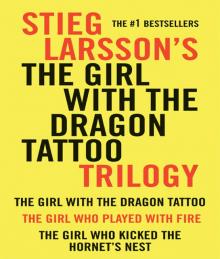- Home
- Stieg Larsson
Millennium 02 - The Girl Who Played with Fire Page 15
Millennium 02 - The Girl Who Played with Fire Read online
Page 15
“Tell me what chances he has of getting his mobility and speech back.”
Dr. Sivarnandan threw out his hands. “Have you got a crystal ball that’s better than mine? The truthful answer is that I have no idea. He could die from a cerebral haemorrhage tonight. Or he could live a relatively normal life for another twenty years. I have no way of knowing. You might say it’s God who decides.”
“And if he lives another twenty years?”
“It’s been a laborious rehabilitation for him, and it’s only in the past few months that we have been able to see improvements. Six months ago he couldn’t eat without assistance. One month ago he could hardly get out of his chair, which is partly due to muscle atrophy from being in bed for so long. Now at least he can walk by himself for short distances.”
“Can he get better?”
“Yes. Even a lot better. The first threshold was hard, but now we’re seeing progress every day. He has lost almost two years of his life. In a few months, by the summer, I hope he’ll be able to walk in the park.”
“And his speech?”
“His problem is that both his speech centre and his ability to move were knocked out. He was helpless for a long time. Since then he has been forced to learn how to control his body and talk again. He doesn’t always remember which words to use, and he has to learn some words again. But it’s not like teaching a child to talk—he knows the meaning of the word, he just can’t articulate it. Give him a couple of months and you’ll see how his speech has improved compared with today. The same is true of his ability to get around. Nine months ago he couldn’t tell left from right, or up from down in the elevator.”
Salander thought about this for a minute. She discovered that she liked this Dr. A. Sivarnandan with the Indian looks and the Finnish accent.
“What does the A stand for?” she asked.
He gave her an amused look. “Anders.”
“Anders?”
“I was born in Sri Lanka but then adopted by a couple in Åbo when I was three months old.”
“OK, Anders, how can I help?”
“Visit him. Give him intellectual stimulation.”
“I can come every day.”
“I don’t want you to be here every day. If he likes you, I want him to look forward to your visits, not get bored with them.”
“Could any type of special care improve his odds? I can pay whatever it costs.”
He smiled at Salander. “I’m afraid that we’re all the special care there is. Of course I wish we had more resources and that the cutbacks didn’t affect us, but I assure you that he’s getting very competent care.”
“And if you didn’t have to worry about the cutbacks, what else could you offer him?”
“The ideal for patients like Holger Palmgren, of course, would be if I could offer him a full-time personal trainer. But it’s been quite a while since we had resources like that in Sweden.”
“Hire one.”
“Excuse me?”
“Hire him a personal trainer. Find the best you can. Please do it first thing tomorrow. And make sure he has everything he needs in the way of technical equipment. I’ll see to it that the funds are available by the end of the week to pay for it.”
“Are you pulling my leg, young lady?”
Salander gave Dr. Anders Sivarnandan her hard, steady look.
Johansson braked and pulled her Fiat over to the curb outside Gamla Stan tunnelbana station. Svensson opened the door and slipped into the passenger seat. He leaned over and gave her a kiss on the cheek as she drew away behind a bus.
“Hello, you,” she said without taking her eyes off the traffic. “You look so serious. Has something happened?”
Svensson sighed as he fastened his seat belt.
“No, nothing major. A little problem with the manuscript is all.”
“What problem?”
“Two months till the deadline. I’ve done only nine of the twenty-two confrontations we planned. I’m having trouble with Björck at the Security Police. The bastard is on long-term sick leave and he’s not answering his home telephone.”
“Is he in hospital?”
“Don’t know. Have you ever tried getting information out of Säpo? They won’t even admit that he works there.”
“Did you try his parents?”
“Both dead. He’s not married. He has a brother who lives in Spain. I just have no idea how to get hold of him.”
Johansson glanced at her partner as she navigated across Slussen to the tunnel leading to Nynäsvägen.
“Worst-case scenario, we jettison the section on Björck. Blomkvist insists that everyone we’re planning to expose must have a chance to comment before being hung out to dry.”
“But it would be a shame to miss out on a representative of the Security Police who runs around with prostitutes. What are you going to do?”
“Find him, of course. How are you doing? Nervous?”
He poked her carefully in the side.
“Actually, no. In two months I have to defend my dissertation and become a full-fledged doctor, and I feel as cool as a cucumber.”
“You know the subject backwards. Why be nervous?”
“Look behind you.”
Svensson turned and saw an open box on the backseat.
“Mia—it’s printed!” he said in delight. He held up a copy of the bound thesis.
From Russia with Love
Trafficking, Organized Crime, and Society’s Response
by Mia Johansson
“It wasn’t going to be ready until next week. Damn … we’re going to have to crack open a bottle when we get home. Congratulations, Doctor!”
He leaned over and kissed her again.
“Calm down. I won’t be a doctor for another two months. And keep your hands under control while I’m driving.”
Svensson laughed. Then he turned serious.
“By the way, fly in the ointment and all that… you interviewed a girl named Irina P. about a year ago.”
“Irina P., twenty-two, from St. Petersburg. She first came here in 1999 and has made some return trips. What about her?”
“I ran into Gulbrandsen today. The policeman involved in the Södertälje brothel investigation. Did you read last week that they’d found a girl floating in the canal there? There were headlines in the evening papers. It was Irina P.”
“Oh no. That’s horrible.”
They drove in silence past Skanstull.
“She’s in my thesis,” Johansson said at last. “I gave her the pseudonym Tamara.”
Svensson turned to the interview section of “From Russia with Love” and leafed through it to find “Tamara.” He read with concentration as Mia passed Gullmarsplan and the Globe Arena.
“She was brought here by somebody you call Anton.”
“I can’t use real names. I might get criticism for it during my oral exams, but I cannot name the girls. It would put them in real, mortal danger. And obviously I can’t identify the johns either, since they could work out which of the girls I had talked to. So in all the case studies I only use pseudonyms.”
“Who’s Anton?”
“His name is probably Zala. I’ve never been able to pin down who he is, but I think he’s a Pole or a Yugoslav and that’s not his real name. I talked with Irina P. four or five times, and it wasn’t until our last meeting that she told me his name. She was trying to straighten out her life and get out of the business, but she was certainly really afraid of him.”
“I’m just wondering … I ran into the name Zala a week or so ago.”
“Where was that?”
“I confronted Sandström—the john who’s a journalist. A complete bastard.”
“In what way?”
“He’s not a real journalist. He does advertising newsletters for various companies. And he has sick fantasies about rape that he’d get off on with that girl…”
“I know. I was the one who interviewed her.”
“But did you know t
hat he did the text for a brochure about sexually transmitted diseases for the Public Health Institute?”
“I didn’t know that.”
“I confronted him last week. He totally lost it when I laid out all the evidence and asked why he uses teenage prostitutes from the East to live out his rape fantasies. Gradually I got some sort of explanation out of him.”
“And what was it?”
“Sandström had gotten into a situation where he wasn’t just another customer. He also ran errands for the sex mafia. He gave me the names he knew, including this Zala. He didn’t say anything specific about him, but it’s not a common name.”
Johansson glanced at him.
“Do you know who he is?” Svensson said.
“No. I’ve never been able to identify him. He’s just a name that crops up now and then. The girls all seem terrified of him, and none of them was willing to tell me anything else.”
CHAPTER 9
Sunday, March 6–Friday, March 11
Dr. Sivarnandan stopped in his tracks on his way into the dining room when he caught sight of Palmgren and Salander. They were bent over their chessboard. She came once a week now, usually on Sundays. She always arrived at around 3:00 and spent a couple of hours playing chess with Palmgren. She left around 8:00 in the evening, when it was time for him to go to bed. The doctor had observed that she did not treat him as you would an invalid—on the contrary, it looked like they were squabbling all the time, and she did not mind Palmgren waiting on her, fetching her coffee.
Dr. Sivarnandan could not make her out, this peculiar young woman who took herself for Palmgren’s foster daughter. She had a very striking look about her and she seemed to treat everything around her with suspicion. She appeared to have no sense of humour at all. Or the ability to carry on a normal conversation. And when he asked what kind of work she did, she somehow contrived not to give him an answer.
A few days after her first visit she had come back with a bundle of documents which declared that a nonprofit foundation had been established with the sole purpose of assisting the care centre with Palmgren’s rehabilitation. The chair of the trustees of the foundation was a lawyer in Gibraltar. There was another lawyer mentioned, also with an address in Gibraltar, and an accountant by the name of Hugo Svensson with an address in Stockholm. The foundation was to make available funds of up to 2.5 million kronor, which Dr. Sivarnandan could dispose of as he wished, but with the exclusive object of giving the patient Holger Palmgren every possible care and facility towards full recovery. Sivarnandan had only to request the necessary funds from the accountant.
It was an unusual, if not unique, arrangement. Sivarnandan had thought hard for several days about whether there was anything unethical about the situation. He decided that there was not and accordingly hired Johanna Karolina Oskarsson as Holger Palmgren’s personal assistant and trainer. She was thirty-nine, a certified physical therapist with a degree in psychology and with extensive experience in rehabilitation care. To Sivarnandan’s surprise her first month’s salary was paid to the hospital in advance, as soon as her employment contract was signed. Until then he had vaguely worried that this might be some sort of hoax.
Within a month Palmgren’s coordination and overall condition had markedly improved. This could be seen from the tests he underwent every week. How much the improvement was due to the training and how much was thanks to Salander, Sivarnandan could only wonder. There was no doubt that Palmgren was making great efforts and looked forward to her visits with the enthusiasm of a child. It even seemed to amuse him that he was regularly pummelled at the chessboard.
Dr. Sivarnandan had kept them company on one occasion. Palmgren was playing white and had opened the Sicilian quite correctly. He had pondered each move long and hard. Whatever his physical handicap as a result of the stroke, there was nothing wrong now with his intellectual acuity.
Salander sat there reading a book on the frequency calibration of radio telescopes in a weightless state. She was sitting on a cushion, the better to be level with the table. When Palmgren made his move she glanced up and moved her piece, apparently without studying the board, and went back to her book. Palmgren resigned after the twenty-seventh move. Salander looked up and with a frown inspected the board for perhaps fifteen seconds.
“No,” she said. “You have a chance for a stalemate.”
Palmgren sighed and spent five minutes studying the board. At last he narrowed his gaze at Salander.
“Prove it.”
She turned the board around and took over his pieces. She forced a stalemate on the thirty-ninth move.
“Good Lord,” Sivarnandan said.
“That’s the way she is. Don’t ever play with her for money,” Palmgren said.
Sivarnandan had played chess himself since he was a boy, and as a teenager he was in the school tournament in Åbo, and came in second. He regarded himself as a competent amateur. Salander, he could see, was an uncanny chess player. She had obviously never played for a club, and when he mentioned that the game seemed to have been a variant of a classic game by Lasker, she gave him an uncomprehending look. She had never heard of Emanuel Lasker. He could not help wondering whether her talent was innate, and if so, whether she had other talents that might interest a psychologist.
But he did not say a word. He could see that his patient was feeling better than he ever had since coming to Ersta.
Bjurman arrived home late in the evening. He had spent four whole weeks at his summer cabin outside Stallarholmen, but he was dispirited. Nothing had happened to change his situation except that the giant had informed him that his people were interested in the proposal and that it would cost him 100,000 kronor.
Mail was piled up on the doormat. He put it all on the kitchen table. He was less and less interested in everything to do with work and the outside world, and he did not look at the letters until later in the evening. Then he shuffled through them absentmindedly.
One was from Handelsbanken. It was a statement for the withdrawal of 9,312 kronor from Lisbeth Salander’s savings account.
She was back.
He went into his office and put the document on his desk. He looked at it with hate-filled eyes for more than a minute as he collected his thoughts. He was forced to look up the telephone number. Then he lifted the receiver and dialled the number of a mobile with a prepaid calling card.
The blond giant answered with a slight accent: “Yes?”
“It’s Nils Bjurman.”
“What do you want?”
“She’s back in Sweden.”
There was a brief silence at the other end.
“That’s good. Don’t call this number again.”
“But—”
“You will be notified shortly.”
Then, to his considerable irritation, the connection was cut. Bjurman swore to himself. He went over to the drinks cabinet and poured himself a triple measure of Kentucky bourbon. He swallowed the drink in two gulps. I’ve got to go easy on the booze, he thought. Then he poured one more measure and took the glass back to his desk, where he looked at the statement from Handelsbanken again.
• • •
Mimmi was massaging Salander’s back and neck. She had been kneading intently for twenty minutes while Salander mainly enjoyed herself and uttered an occasional groan of pleasure. A massage from Mimmi was a fantastic experience, and she felt like a kitten who just wanted to purr and wave its paws around.
She stifled a sigh of disappointment when Mimmi slapped her on the backside and said that should do it. For a while she lay still in the vain hope that Mimmi would go on, but when she heard her pick up her wineglass, Salander rolled onto her back.
“Thank you,” she said.
“You’re sitting in front of your computer all day. That’s why your back hurts.”
“I just pulled a muscle.”
They were lying naked in Mimmi’s bed on Lundagatan, drinking red wine and feeling silly. Since Salander had resumed her friendshi
p with Mimmi, it was as if she couldn’t get enough of her. It had become a bad habit to call her every day—much too often. She looked at Mimmi and reminded herself not to get too close to anyone again. It might end with someone getting hurt.
Mimmi leaned over the edge of the bed and opened the drawer of her bedside table. She took out a small flat package wrapped in flowered paper with a gold bow and tossed it into Lisbeth’s lap.
“What’s this?”
“Your birthday present.”
“My birthday’s more than a month away.”
“It’s your present from last year, but I couldn’t find you.”
“Should I open it?”
“If you feel like it.”
She put down her wineglass, shook the package, and opened it carefully. She drew out a beautiful cigarette case with a lid of blue and black enamel and some tiny Chinese characters as decoration.
“You really should stop smoking,” Mimmi said. “But if you won’t, at least you can keep your cigarettes in a pretty box.”
“Thank you,” Salander said. “You’re the only person who ever gives me birthday presents. What do the characters mean?”
“How on earth would I know that? I don’t understand Chinese. I just found it at the flea market.”
“It’s beautiful.”
“It’s just some cheap nothing, but it looked as if it was made for you. We’ve run out of wine. You want to go out and get a beer?”
“Does that mean we have to leave the bed and get dressed?”
“I’m afraid so. But what’s the point of living in Söder if you can’t go to a bar now and then?”
Salander sighed.
“Come on,” Mimmi said, pointing at the jewel in Salander’s navel. “We can come back here afterwards.”
Salander sighed again, but she put one foot on the floor and reached for her underwear.
Svensson was working late at the desk he had been assigned in a corner of the Millennium offices when he heard the rattle of a key in the door. He looked at the clock and saw that it was past 9:00 p.m. Blomkvist seemed surprised to find someone still working there.

 The Girl with the Dragon Tattoo
The Girl with the Dragon Tattoo The Girl Who Kicked the Hornet's Nest
The Girl Who Kicked the Hornet's Nest The Girl Who Played with Fire
The Girl Who Played with Fire The Girl with the Dragon Tattoo m(-1
The Girl with the Dragon Tattoo m(-1 The Girl who played with Fire m(-2
The Girl who played with Fire m(-2 Millennium 01 - The Girl with the Dragon Tattoo
Millennium 01 - The Girl with the Dragon Tattoo The Girl Who Kicked The Hornets’ Nest m(-3
The Girl Who Kicked The Hornets’ Nest m(-3 Millennium 02 - The Girl Who Played with Fire
Millennium 02 - The Girl Who Played with Fire Millennium 03 - The Girl Who Kicked the Hornet's Nest
Millennium 03 - The Girl Who Kicked the Hornet's Nest The Girl With the Dragon Tattoo Trilogy Bundle
The Girl With the Dragon Tattoo Trilogy Bundle![Millenium [02] The Girl Who Played With Fire Read online](http://i1.bookreadfree.com/i2/04/12/millenium_02_the_girl_who_played_with_fire_preview.jpg) Millenium [02] The Girl Who Played With Fire
Millenium [02] The Girl Who Played With Fire